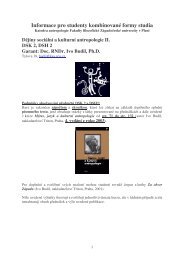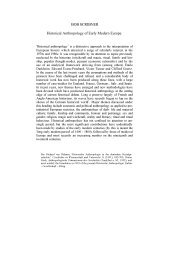THE REVIVAL OF NARRATIVE 5widely recognized, with some justice, that answering the what and thehow questi<strong>on</strong>s in a chr<strong>on</strong>ological fashi<strong>on</strong>, even if directed by a centralargument, does not in fact go very far towards answering the whyquesti<strong>on</strong>s. Moreover historians were at that time str<strong>on</strong>gly under theinfluence <str<strong>on</strong>g>of</str<strong>on</strong>g> both Marxist ideology and social science methodology. Asa result they were interested in societies not individuals, and were c<strong>on</strong>fidentthat a "scientific history" could be achieved which would intime produce generalized laws to explain historical change.Here we must pause again to define what is meant by "scientifichistory". <str<strong>on</strong>g>The</str<strong>on</strong>g> first "scientific history" was formulated by Ranke in thenineteenth century and was based <strong>on</strong> the study <str<strong>on</strong>g>of</str<strong>on</strong>g> new sourcematerials. It was assumed that close textual criticism <str<strong>on</strong>g>of</str<strong>on</strong>g> hithertoundisclosed records buried in state archives would <strong>on</strong>ce and forall establish the facts <str<strong>on</strong>g>of</str<strong>on</strong>g> political history. In the last thirty yearsthere have been three very different kinds <str<strong>on</strong>g>of</str<strong>on</strong>g> "scientific history"current in the pr<str<strong>on</strong>g>of</str<strong>on</strong>g>essi<strong>on</strong>, all based not <strong>on</strong> new data, but <strong>on</strong> newmodels or new methods: they are the Marxist ec<strong>on</strong>omic model, theFrench ecological/demographic model, and the American "cliometric"methodology. According to the old Marxist model, history moves in adialectical process <str<strong>on</strong>g>of</str<strong>on</strong>g> thesis and antithesis, through a clash <str<strong>on</strong>g>of</str<strong>on</strong>g> classeswhich are themselves created by changes in c<strong>on</strong>trol over the means <str<strong>on</strong>g>of</str<strong>on</strong>g>producti<strong>on</strong>. In the 1930s this idea resulted in a fairly simplisticec<strong>on</strong>omic/social determinism which affected many young scholars <str<strong>on</strong>g>of</str<strong>on</strong>g>the time. It was a noti<strong>on</strong> <str<strong>on</strong>g>of</str<strong>on</strong>g> "scientific history" which was str<strong>on</strong>glydefended by Marxists up to the late 1950s. It should, however, benoted that the current generati<strong>on</strong> <str<strong>on</strong>g>of</str<strong>on</strong>g> "neo-Marxists" seems to haveaband<strong>on</strong>ed most <str<strong>on</strong>g>of</str<strong>on</strong>g> the basic tenets <str<strong>on</strong>g>of</str<strong>on</strong>g> the traditi<strong>on</strong>al Marxisthistorians <str<strong>on</strong>g>of</str<strong>on</strong>g> the 1930s. <str<strong>on</strong>g>The</str<strong>on</strong>g>y are now as c<strong>on</strong>cerned with the state,politics, religi<strong>on</strong> and ideology as their n<strong>on</strong>-Marxist colleagues, and inthe process appear to have dropped the claim to be pursuing "scientifichistory".<str<strong>on</strong>g>The</str<strong>on</strong>g> sec<strong>on</strong>d meaning <str<strong>on</strong>g>of</str<strong>on</strong>g> "scientific history" is that used since 1945by the Annales school <str<strong>on</strong>g>of</str<strong>on</strong>g> French historians, <str<strong>on</strong>g>of</str<strong>on</strong>g> whom Emmanuel LeRoy Ladurie may stand as a spokesman, albeit a rather extreme <strong>on</strong>e.According to him, the key variable in history is shifts in the ecologicalbalance between food supplies and populati<strong>on</strong>, a balance necessarily tobe determined by l<strong>on</strong>g-term quantitative studies <str<strong>on</strong>g>of</str<strong>on</strong>g> agricultural productivity,demographic changes and food prices. This kind <str<strong>on</strong>g>of</str<strong>on</strong>g> "scientifichistory" emerged from a combinati<strong>on</strong> <str<strong>on</strong>g>of</str<strong>on</strong>g> l<strong>on</strong>g-standing French interestin historical geography and historical demography, coupledwith the methodology <str<strong>on</strong>g>of</str<strong>on</strong>g> quantificati<strong>on</strong>. Le Roy Ladurie told usbluntly that "history that is not quantifiable cannot claim to bescientific" .33 E. Le Roy Ladurie, <str<strong>on</strong>g>The</str<strong>on</strong>g> Territory <str<strong>on</strong>g>of</str<strong>on</strong>g> the Historian, trans. B. and S. Reynolds(Hassocks, I 979), p. I 5, and pt. i, passim.
6 PAST AND PRESENT NUMBER 85<str<strong>on</strong>g>The</str<strong>on</strong>g> third meaning <str<strong>on</strong>g>of</str<strong>on</strong>g> "scientific history" is primarily American,and is based <strong>on</strong> the claim, loudly and clearly expressed by the "cliometricians",that <strong>on</strong>ly their own very special quantitative methodologyhas any claim to be ~cientific.~ According to them the historicalcommunity can be divided into two. <str<strong>on</strong>g>The</str<strong>on</strong>g>re are "the traditi<strong>on</strong>alists",who include both the old-style narrative historians dealing mainlywith state politics and c<strong>on</strong>stituti<strong>on</strong>al history, as well as the "new"ec<strong>on</strong>omic and demographic historians <str<strong>on</strong>g>of</str<strong>on</strong>g> the Annales and Past andPresent schools -despite the fact that the latter use quantificati<strong>on</strong>and that for several decades the two groups were bitter enemies,especially in France. Quite separate are the "scientific historians", thecliometricians, who are defined by a methodology rather than by anyparticular subject-matter or interpretati<strong>on</strong> <str<strong>on</strong>g>of</str<strong>on</strong>g> the nature <str<strong>on</strong>g>of</str<strong>on</strong>g> historicalchange. <str<strong>on</strong>g>The</str<strong>on</strong>g>y are historians who build paradigmatic models, sometimescounter-factual <strong>on</strong>es about worlds which never existed in reallife, and who test the validity <str<strong>on</strong>g>of</str<strong>on</strong>g> the models by the most sophisticatedmathematical and algebraical formulae applied to very largequantities <str<strong>on</strong>g>of</str<strong>on</strong>g> electr<strong>on</strong>ically processed data. <str<strong>on</strong>g>The</str<strong>on</strong>g>ir special field isec<strong>on</strong>omic history, which they have virtually c<strong>on</strong>quered in the UnitedStates, and they have made large inroads into the history <str<strong>on</strong>g>of</str<strong>on</strong>g> recentdemocratic politics by applying their methods to voting behaviour,both <str<strong>on</strong>g>of</str<strong>on</strong>g> the electorate and the elected. <str<strong>on</strong>g>The</str<strong>on</strong>g>se great enterprises arenecessarily the result <str<strong>on</strong>g>of</str<strong>on</strong>g> team-work, rather like the building <str<strong>on</strong>g>of</str<strong>on</strong>g> thepyramids: squads <str<strong>on</strong>g>of</str<strong>on</strong>g> diligent assistants assemble data, encode it,programme it, and pass it through the maw <str<strong>on</strong>g>of</str<strong>on</strong>g> the computer, all underthe autocratic directi<strong>on</strong> <str<strong>on</strong>g>of</str<strong>on</strong>g> a team-leader. <str<strong>on</strong>g>The</str<strong>on</strong>g> results cannot be testedby any <str<strong>on</strong>g>of</str<strong>on</strong>g> the traditi<strong>on</strong>al methods since the evidence is buried inprivate computer-tapes, not exposed in published footnotes. In anycase the data are <str<strong>on</strong>g>of</str<strong>on</strong>g>ten expressed in so mathematically rec<strong>on</strong>dite aform that they are unintelligible to the majority <str<strong>on</strong>g>of</str<strong>on</strong>g> the historical pr<str<strong>on</strong>g>of</str<strong>on</strong>g>essi<strong>on</strong>.<str<strong>on</strong>g>The</str<strong>on</strong>g> <strong>on</strong>ly reassurance to the bemused laity is that the members<str<strong>on</strong>g>of</str<strong>on</strong>g> this priestly order disagree fiercely and publicly about the validity <str<strong>on</strong>g>of</str<strong>on</strong>g>each other's findings.<str<strong>on</strong>g>The</str<strong>on</strong>g>se three types <str<strong>on</strong>g>of</str<strong>on</strong>g> "scientific history" overlap to some degree, butthey are sufficiently distinct, certainly in the eyes <str<strong>on</strong>g>of</str<strong>on</strong>g> their practiti<strong>on</strong>ers,to justify the creati<strong>on</strong> <str<strong>on</strong>g>of</str<strong>on</strong>g> this tripartite typology.Other "scientific" explanati<strong>on</strong>s <str<strong>on</strong>g>of</str<strong>on</strong>g> historical change have risen t<str<strong>on</strong>g>of</str<strong>on</strong>g>avour for a while and then g<strong>on</strong>e out <str<strong>on</strong>g>of</str<strong>on</strong>g> fashi<strong>on</strong>. French structuralismproduced some brilliant theorizing, but no single major work <str<strong>on</strong>g>of</str<strong>on</strong>g>history -unless <strong>on</strong>e c<strong>on</strong>siders Michel Foucault's writings as primarilyworks <str<strong>on</strong>g>of</str<strong>on</strong>g> history, rather than <str<strong>on</strong>g>of</str<strong>on</strong>g> moral philosophy withexamples drawn from history. Pars<strong>on</strong>ian functi<strong>on</strong>alism, which itself'An unpublished paper by R. W. Fogel, "Scientific <strong>History</strong> and Traditi<strong>on</strong>al<strong>History</strong>" (1979), <str<strong>on</strong>g>of</str<strong>on</strong>g>fers the most persuasive case that can be mustered for regardingthis as the <strong>on</strong>e and <strong>on</strong>ly truly "scientific" history. But I remain unc<strong>on</strong>vinced.







